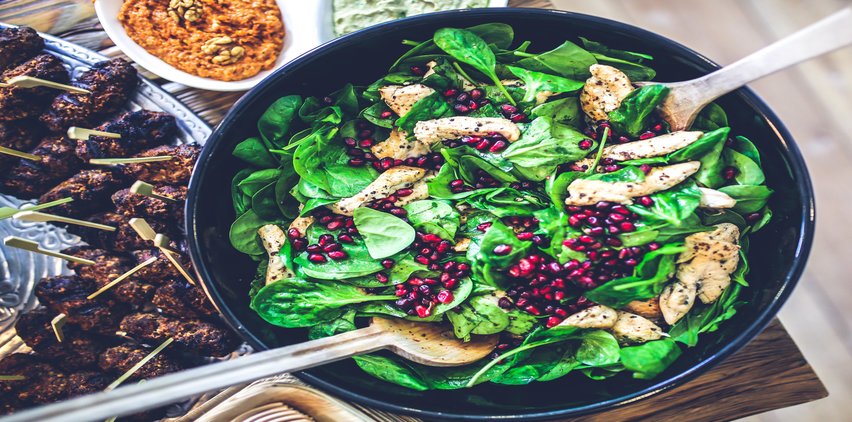

March 29, 2018 | Categories: Health
Eating the right foods and getting enough of certain nutrients is more important at specific times of a woman’s life. We talked to Kristin Kirkpatrick, R.D. Spokesperson for the Academy of Dietetics and Nutrition, and Dr. Jennifer Caudle, Family Physician, Associate Professor at Rowan University School of Osteopathic Medicine, for their tips on how women should eat at every stage of life from teenage years through her senior decades. Here are the most important foods and nutrients to work into your diet for optimum health.
As Dr. Caudle points out, it’s very important that teens eat a well-balanced diet in general because they’re still growing. Since major organs like their brains and hearts are still developing and maturing, eating the right types of food can make a major impact. During the teen years, Kirkpatrick recommends folate, calcium, iron, healthy fats and adequate calorie consumption. Dr. Caudle adds, “These young women may have just started their periods and depending on the flow it can cause a loss of iron. Eating iron-rich foods including lean beef, chicken, turkey, vegetables, leafy greens, whole grains, beans, and lentils maybe be beneficial.”
It’s important to make sure teens learn healthy eating habits, like having wholesome meals, snacking on healthy foods, and avoiding drastic diets. Population-based studies conducted in the USA indicate that around 45% of adolescent girls engaged in persistent use of unhealthful weight control behaviors, like dieting and using diet pills during their teenage years.
Learn about which protein is best for your diet.
Whether this young woman is gradating college, starting out her career, or having children, nutrition through a balanced diet is very important during childbearing years.
“Although this demographic is very busy, we still want to emphasize the importance of a well-rounded proper diet, which I think is sometimes very difficult these days to get,” said Dr. Caudle. “Theoretically…if we have a well-balanced diet, we’ll be able to get the nutrients that we need. But there are some special considerations, especially because women in their 20s and 30s are in their child-bearing potential years. For women who desire pregnancy, [doctors] definitely recommend additional folic acid because it helps prevent birth defects in infants For women who desire pregnancy, they should get 400 to 800 units of folic acid a day and we do recommend that via supplement so that’s very important,” Dr. Caudle said.
“If you know that you’re planning to get pregnant in the near future and you’re actively planning it out, I would start taking that supplement to kind of build up your stores and get your body ready to carry a child,” Dr. Caudle said.
A woman in this demographic might be so busy that she thinks it’s a challenge to work in balanced nutrition at every meal. She should consider making a smoothie to maximize nutrients and vitamins in an on-the-go snack or meal replacement.
“If you’re not able to make the big salad and chop up everything and do all this stuff to get all of your veggies and you want to throw them in a blender and blend them up and drink them, that’s fine by me,” said Dr. Caudle. “I think the most important thing is to take [veggies and fruits] in and there are different ways to do that. I use a lot of frozen veggies, frozen spinach and can totally use these shortcuts whether you’re blending things or…you just to make sure you’re getting in all the vitamins and nutrients,” Dr. Caudle said.
A higher intake of calcium is associated with stronger bones, reduced risk of hypertension and weight management, said Kirkpatrick. “Your peak bone mass is reached by age 30 so your 20s are a great time to maximize bone health nutrition,” Kirkpatrick said.
Make sure you’re eating whole grains for a healthy heart.
We typically see most of our bone loss happening when we stop getting our periods when we stop having the help of estrogen, which tends to be in the 40s, said Dr. Caudle. “But, calcium is still very important in your 30s. We still want women to have healthy bones and even to prepare for the menopausal stage. Make sure you’re taking in sources of calcium, and that you’re exercising regularly because exercise helps build strength for bones. It’s very important and it’s not too early to start thinking your bone health in your 20s and 30s,” Dr. Caudle said.
Make sure you’re getting 12 ounces of high-quality fish in your diet like mackerel, tuna, salmon and trout weekly in your diet. This can help slow down cartilage degeneration and improve joint health, said Kirkpatrick. Eating omega-3 fatty acids helps prevent heart disease and reduce triglycerides, she said.
Cut back on sugar consumption, since calories from added sugars increase your risk of heart disease (LDL), inflammation, cancer, and weight gain, Kirkpatrick said. Aim for less than 100 calories a day from sugar (6 teaspoons for women), advised Kirkpatrick. Eliminate artificial sweeteners from your diet as well since those may pose health risks and don’t help many people with weight management, according to studies.
Read the full gallery on DoctorOz.com.
Try theses 8 clean-eating recipes to satisfy any craving.
Leave a Reply